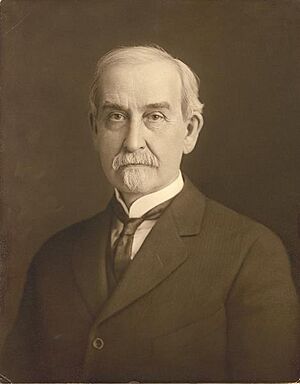Frank Avery Hutchins facts for kids
Quick facts for kids
Frank Avery Hutchins
|
|
|---|---|

Portrait of Hutchins
|
|
| Born | March 8, 1851 Norwalk, Ohio, US
|
| Died | January 25, 1914 (aged 62) |
| Burial place | Baraboo, Wisconsin |
| Known for |
|
Frank Avery Hutchins (born March 8, 1851 – died January 25, 1914) was an American teacher and librarian. He helped start important groups like the Wisconsin Library Association and the Wisconsin Free Library Commission. These groups made it easier for people in Wisconsin to get books.
Contents
Early Life and Education
Frank Hutchins was born in Norwalk, Ohio, on March 8, 1851. His father, Allen Sabin Hutchins, was a school principal. When Frank was one year old, his family moved to Wisconsin.
His father became the head of Wayland University in Beaver Dam. The family moved several times because his father was sick. Frank studied at Beloit College from 1871 to 1873. He had to leave before graduating because he became ill.
Starting His Career
In 1874, Hutchins became a teacher in Fond du Lac, Wisconsin. His uncle was in charge of the high schools there. After teaching, he worked for a book company. He then had another period of illness.
In 1884, he became the editor of a local newspaper called the Beaver Dam Argus. He worked there until 1891. During this time, he also worked as the city clerk. He saw that his community needed more books. So, he helped create the Beaver Dam Free Library Association in August 1884. This was a big step in his work with libraries.
Bringing Books to Everyone
In 1891, Frank Hutchins was chosen to be a library clerk for the state. He started a program called "traveling libraries" across Wisconsin. These were like small, portable libraries that moved from town to town. They helped bring books to people in rural areas who didn't have local libraries. He also worked to set up libraries in public schools.
Founding Library Organizations
Hutchins was one of the people who started the Wisconsin Library Association in 1891. He was its first secretary. Later, he became its President from 1894 to 1897.
He met Lutie Stearns at the first meeting of this association. Together with Senator James Huff Stout, they were key in creating the Wisconsin Free Library Commission. This commission was based on similar ideas from Massachusetts and New Hampshire.
Hutchins wrote the bill that Senator Stout helped pass into law in 1895. This law officially formed the Commission. Governor Upham appointed Hutchins and Stearns as the first officers. In 1897, Hutchins became the paid secretary and chief executive officer. He held this important role until 1904, when he resigned due to poor health.
Key Achievements for Libraries
As secretary of the Commission, Hutchins did many important things:
- He wrote new laws about libraries.
- He set up the traveling library system.
- He organized a summer school to train librarians in small towns.
- He planned for new public libraries in many small communities.
He also came up with the idea for the Legislative Reference Library. This library would help lawmakers get information they needed. Cornelia Marvin helped make this idea a reality after Hutchins became ill. This project became the life's work of Charles McCarthy. McCarthy called Hutchins "the father of Wisconsin public libraries."
Later Work and Legacy
In 1907, Hutchins became the secretary of the University Extension division. He also led debates and public discussions at the University of Wisconsin–Madison. This work helped share knowledge from the university with more people.
Hutchins was also active in public health. He helped the Wisconsin Anti-Tuberculosis Association raise money. He did this through the Christmas seal campaign in 1908. He also worked to protect state parks and nature.
Death and Lasting Impact
Frank Hutchins died on January 25, 1914. He was buried in Baraboo. A special service was held to honor him at the University Music Hall. Speakers included Lutie Stearns and Jane Addams.
Hutchins is remembered for his work in spreading the "Wisconsin Idea." This idea was about making education and resources available to everyone. McCarthy called him a "great seer and warm-hearted idealist." This was because Hutchins started Wisconsin's traveling libraries and the public libraries that grew from them.
His helpful guides, like Books for Small Libraries, were later used by the American Library Association. They became the basis for the Booklist, which helps libraries choose new books.
On November 6, 2008, Frank Hutchins was honored. He was inducted into the Wisconsin Library Hall of Fame.

